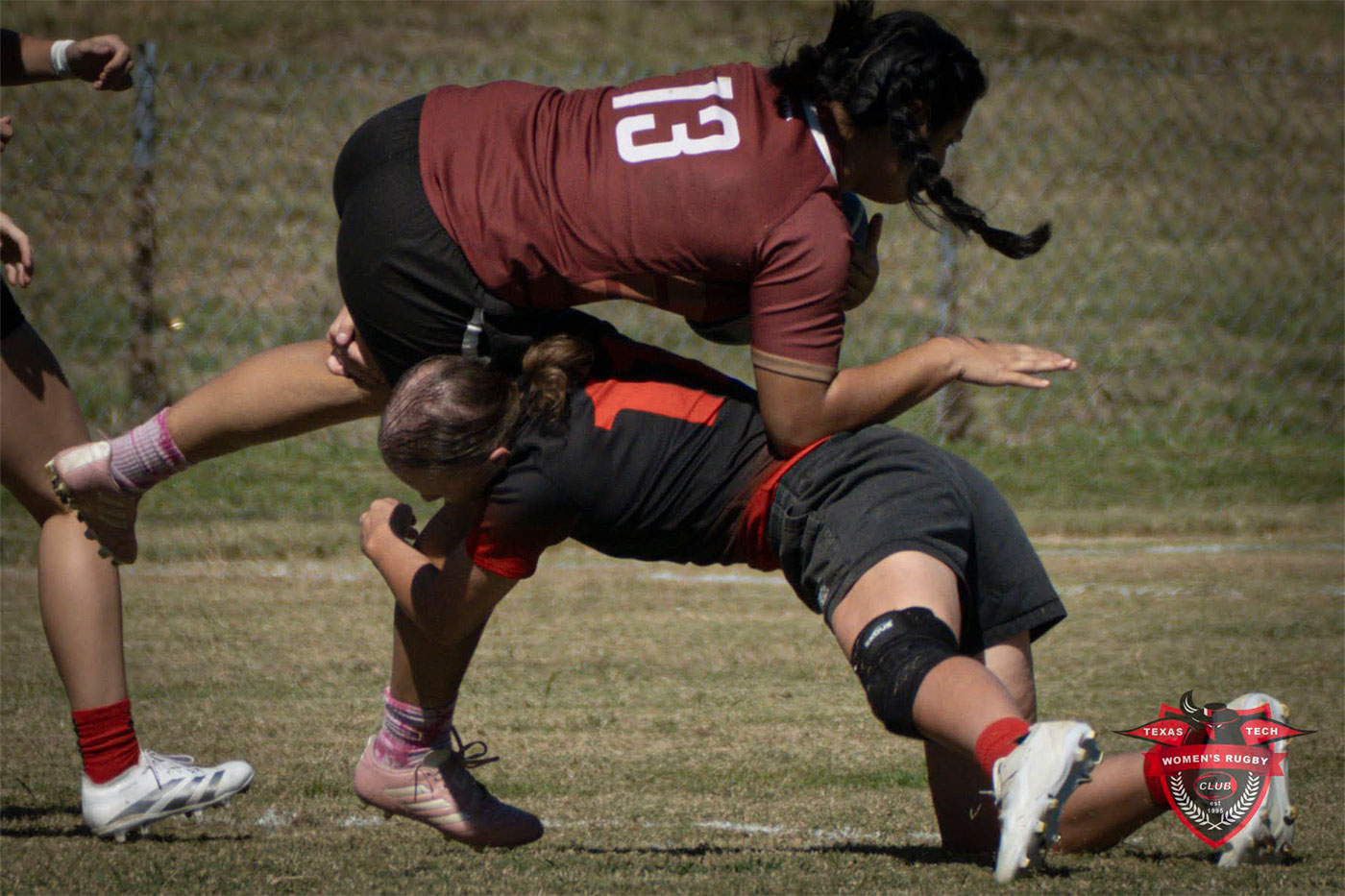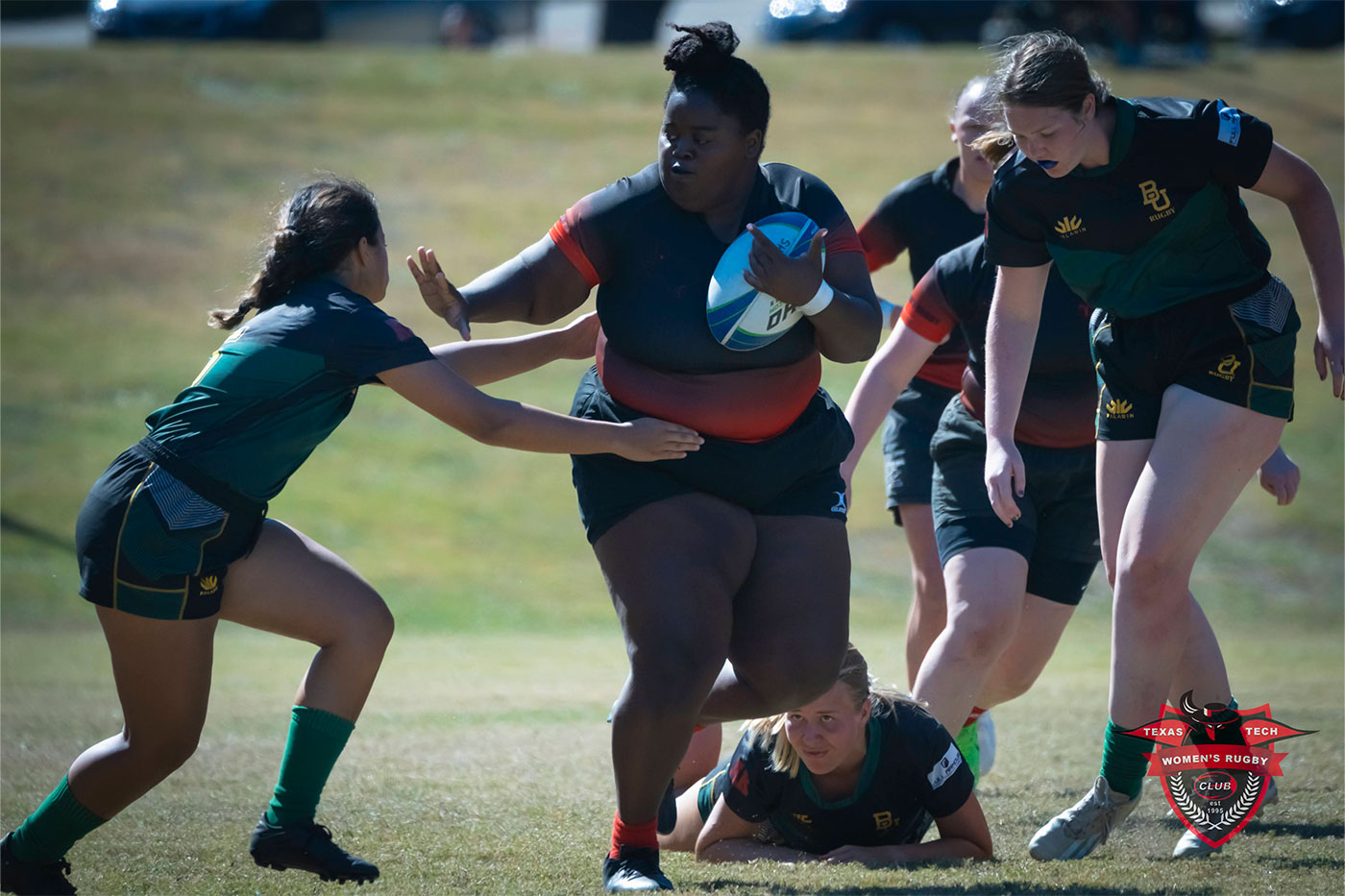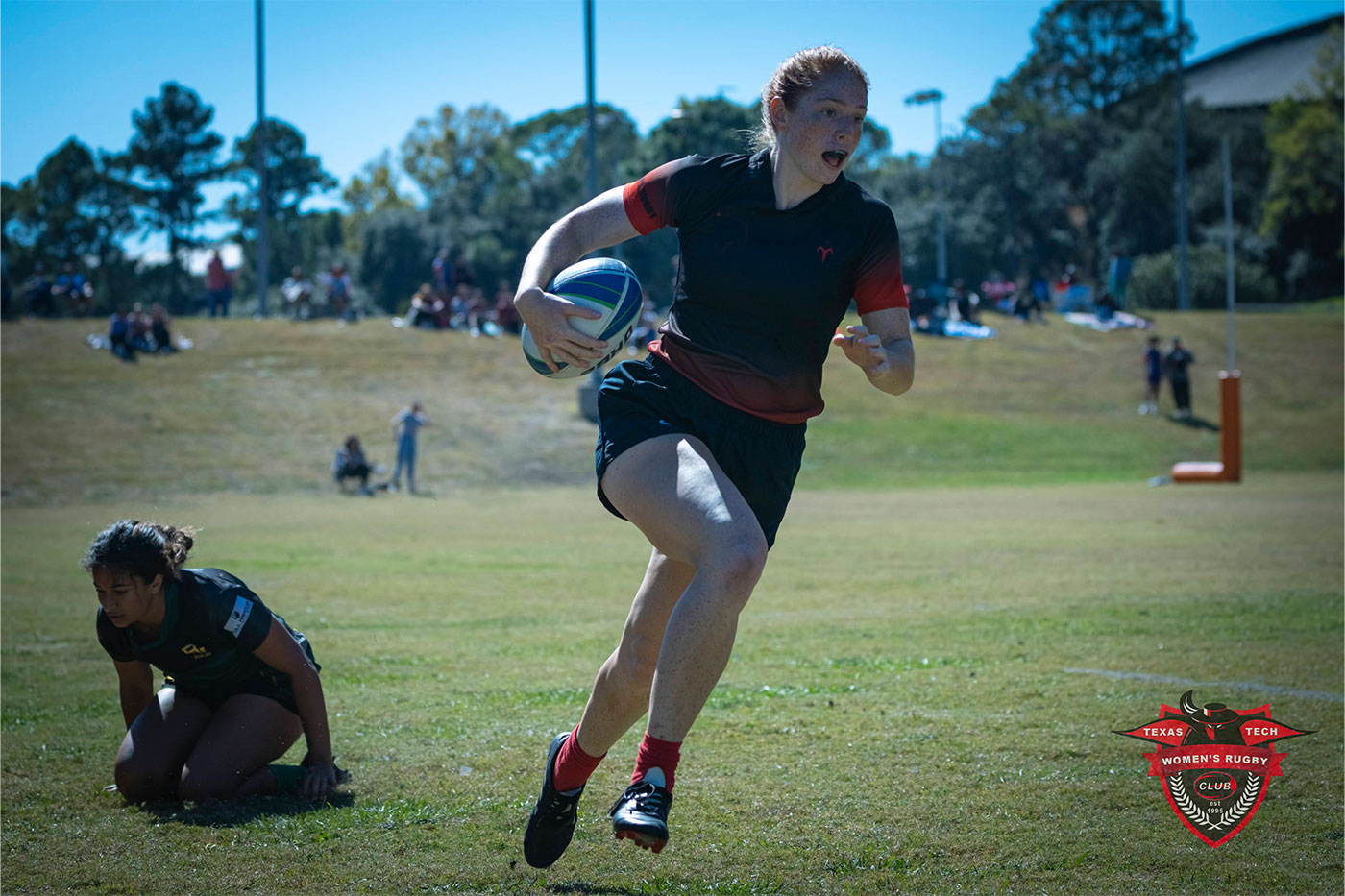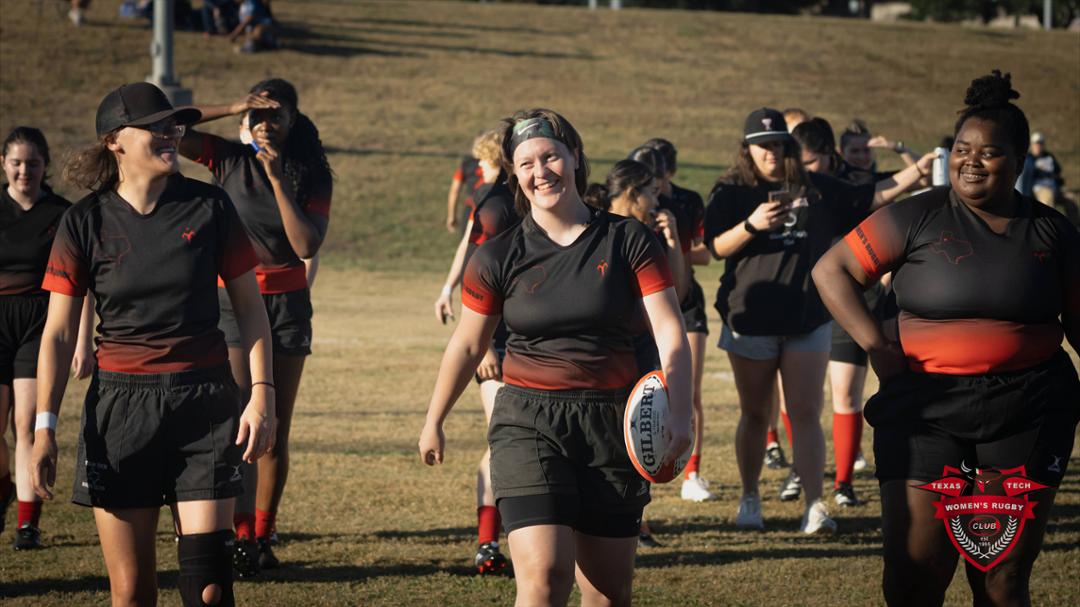The recreational club team’s stellar performance this semester continues their trend of accomplishments that started in the fall of 2023.
All the way from Paris, Team USA Women’s Rugby Sevens’ landmark accomplishment of winning bronze in the 2024 Olympics sent shock waves throughout the U.S.
American viewers and beyond were entranced by team sensation Ilona Maher, a former basketball, field hockey and soccer player whose social media influence exploded during and after the U.S.’s historic run. The momentum added onto rugby’s continued growth across the nation over the past five years, which also includes a 12% increase in USA Youth and High School Rugby registrations from 2023 to 2024.
The impact of Maher’s stardom and Team USA’s success trickled down to Texas Tech University, as its recreational women’s rugby club saw its membership jump from nine last semester to 30 this fall.
That incoming class bolstered the team’s competitive depth, a key factor on the way to capturing a Lonestar Conference title for the first time in November.
Anish Quenim, coach and associate director of the Jerry S. Rawls College of Business’ Alderson & Griffin Center for Family Business and Entrepreneurship, said watching his team bring the trophy home was phenomenal.
“There wasn’t a minute when any of us didn’t believe we could win, although our focus was not on victory but on the process,” Quenim said. “I could see that with the girls; they were taking every play at a time, every second at a time.”
The team had a culture of respecting its opposition, never underestimating who lined up across from them and never succumbing to the moment. Current president and third-year student Kaylee Kemp, along with past president and fourth-year student Leah Lockerman, were instrumental to maintaining that tradition, especially with all the changes to the team.
Both were on the team last fall when they finished with a bronze medal. Having notched Texas Tech’s first conference medal, their confidence was already building, but the events of this summer contributed to their excitement.
“It was awesome,” Kemp said of Team USA’s bronze medal win. “I loved it because there’s not many opportunities to watch rugby, so getting to watch the Olympics and watch Team USA go so far was amazing.”
The sequence of national success following that of Texas Tech’s made Kemp feel slightly connected.

As Lockerman observed Team USA’s accomplishments, she envisioned the sweeping changes to come, such as a $4 million donation to USA Rugby from Michele Kang, a businesswoman and investor in professional women’s sports. Additionally, collegiate club teams across Texas saw a marked increase in participation.
Texas Tech’s own roster boost provided encouragement and excitement for the team leaders as the fall semester approached.
The opportunity didn’t come without challenges, however, as the incoming first-years had just a few weeks to learn as much as possible about the sport before the first tournament in September.
Training is easier when the players have backgrounds in basketball, soccer, or wrestling, but like Kemp and Lockerman, most were completely unfamiliar with rugby rules or how to pass and tackle.
“Teaching them can be frustrating, but it’s also really exciting,” Kemp said. “For most of them, once it clicks, they get so excited, they start pushing themselves, and they start pushing their teammates.
“It’s just really cool to see.”
The next step also raises feelings of anxiety with players graduating from controlled, safe practices with each other to facing opposition foaming at the mouth to hit someone wearing a different color.
Despite that, the team stepped up, to the surprise of its leaders. Texas Tech defeated Angelo State, Houston and Oklahoma State in one day to start its season 3-1.
Maybe their success shouldn’t have been such a shock, seeing as both Kemp and Lockerman noticed a spike in players’ attitudes after the first few minutes.
“They realized how much power they have, how strong they are, and what they can do on the field,” said Kemp.
That momentum carried on throughout the semester. Texas Tech lost only one more time through the championship tournament, making sure to provide the first- and second-year players with plenty of opportunities to develop on the field along the way.

Quenim said watching how the upper-level students took in their younger teammates reminded him of the principles of succession in business, part of the course on family business he teaches.
When combining the next generation with the current one, common ground must be created for everyone to be heard. The team’s leadership brought that mindset to life in the most beautiful way possible, Quenim said, cultivating a great, inclusive culture without a clashing of egos or management.
“It’s like the game of rugby but played off the field where we play as a team, we learn as a team, and we associate as a team,” he continued. “The results on the field are just a translation of everything we do off of it.”
The team’s pursuit of coaching and strategy ideation communicated to Quenim their hunger for success, and he described the team’s organization as lacking true rank, including the coaches, allowing for the purest form of collaboration.
Having such a humble group of like-minded people made the victories that followed easy to come by.
Quenim switched to the women’s team in fall 2023 after being a part of a larger panel of coaches for the men’s team, with a decade of prior experience as a player, coach, and organizer in India and the United Arab Emirates.
Always having a long-standing aim to encourage players to find pathways to local, national and international teams, Quenim took that approach with him the women’s rugby club.
He pushed himself to be in a position where he could say to players, “You’ve championed yourself to victory on the field, but I can also see that you’ve grown as amazing individuals who are going to make a big difference in your communities.”
That statement has become a reality through the team’s partnership with “You Try We Tackle,” a campaign from Texas Tech’s Women’s & Gender Studies program. “You Try We Tackle” aims to educate and intervene in cases of girls and women facing intimate partner violence and other instances of violence.
The partnership is also an example of the support that can be found within the women’s rugby community.
The teams are all friends with each other, Lockerman said, and are in consistent communication. Everyone knows each other, and relationships are enhanced by the socials teams host after tournaments.
“You go beat each other up on the field and then you go get dinner with them, which is one of my favorite things about the sport,” said Lockerman.
She witnessed firsthand that camaraderie upon joining the club her first year at Texas Tech, which quickly elevated from mere access to free food to time spent traveling with a small, tight-knit group and playing with her parents in attendance.

Rugby permitted Lockerman to utilize her love of physicality that had to be stifled in other sports, and her skills grew after she was appointed club president her second year. Holding a leadership role meant teaching new players, obligating Lockerman to watch more rugby and learn more about the sport.
Lockerman has also become a role model for new players, such as Kemp, who said Lockerman has been a staple of the team throughout Kemp’s rugby career and taught her so much on and off the field.
“Having the support of upperclassmen is extremely beneficial, and I think that’s one of the best things about our club,” Kemp said. “We have officers, so we are student-led, and that builds friendships and connections.”
The older players are easily accessible for providing advice about adjusting to college life and classes, especially with such a diverse collection of majors on the team.
Kemp has also leaned on Lockerman’s experience as past president to help Kemp navigate her role as president for the 2024-2025 academic year. The position requires great delegation and time management skills, since the club is responsible for its own travel accommodations, uniforms and most other expenses.
Kemp and Lockerman hope the successes achieved locally by Texas Tech and at the national level will lead to further support of the sport, so clubs like Texas Tech don’t have to consistently travel long distances to compete and can worry less about fundraising.
Making rugby an officially sanctioned high school sport would be beneficial, as well, by lessening the burden on college students and raising confidence and excitement to play at the next level.
“Then, we aren’t just recruiting all summer and teaching them everything right off the bat,” Kemp said. “They’re going to start playing in high school, which would make our league more competitive and more fun at the beginning, in that it’s not as stressful.”
Lockerman, who is set to graduate at the end of the fall 2024 semester, will also head to San Diego in late December after receiving an invite to a USA Rugby pathway camp. That development became a possibility only after Lockerman went to Quenim, expressing a desire to achieve beyond collegiate rugby.
Her latest accomplishment only adds to the legacy she’s leaving behind, setting the stage for Texas Tech women’s rugby to continue to thrive.

